
François Duvalier, also known as Papa Doc, was a Haitian politician who served as the president of Haiti from 1957 until his death in 1971. He was elected president in the 1957 general election on a populist and black nationalist platform. After thwarting a military coup d'état in 1958, his regime rapidly became more autocratic and despotic. An undercover government death squad, the Tonton Macoute, indiscriminately tortured or killed Duvalier's opponents; the Tonton Macoute was thought to be so pervasive that Haitians became highly fearful of expressing any form of dissent, even in private. Duvalier further sought to solidify his rule by incorporating elements of Haitian mythology into a personality cult.

The government of Haiti is a semi-presidential republic, a multi-party system wherein the President of Haiti is head of state elected directly by popular elections. The Prime Minister acts as head of government and is appointed by the President, chosen from the majority party in the National Assembly. Executive power is exercised by the President and Prime Minister who together constitute the government. Legislative power is vested in both the government and the two chambers of the National Assembly of Haiti. The government is organized unitarily, thus the central government delegates powers to the departments without a constitutional need for consent. The current structure of Haiti's political system was set forth in the Constitution of March 29, 1987.
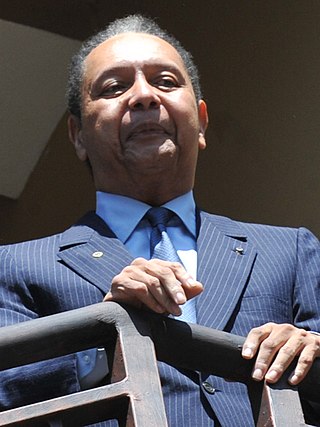
Jean-Claude Duvalier, nicknamed "Baby Doc", was a Haitian politician who was the President of Haiti from 1971 until he was overthrown by a popular uprising in February 1986. He succeeded his father François "Papa Doc" Duvalier as the ruler of Haiti after his death in 1971. After assuming power, he introduced cosmetic changes to his father's regime and delegated much authority to his advisors. Thousands of Haitians were killed or tortured, and hundreds of thousands fled the country during his presidency. He maintained a notoriously lavish lifestyle while poverty among his people remained the most widespread of any country in the Western Hemisphere.
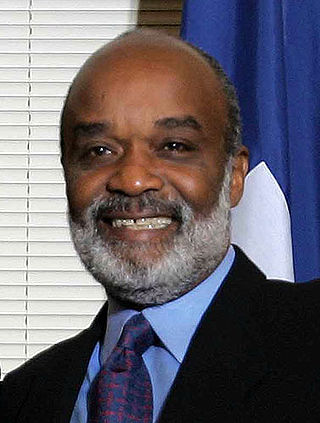
René Garcia Préval was a Haitian politician and agronomist who twice was President of Haiti, from early 1996 to early 2001, and again from mid-2006 to mid-2011. He was also Prime Minister from early to late 1991 under the presidency of Jean-Bertrand Aristide.

Charles Burke Elbrick was a United States diplomat and career foreign service officer. During his career, he served three ambassadorships: in Portugal, Yugoslavia and Brazil, in addition to numerous minor postings.

Jean-Jacques Honorat was a Haitian politician who served as the prime minister of Haiti after the 1991 coup d'état from 1991 until 1992. He was a human rights activist and philanthropist for over 60 years. He was also an author having published 16 books, including a book titled Le manifeste du dernier monde in 1980.

Haiti–United States relations are bilateral relations between Haiti and the United States. Succeeding U.S. presidents refused to recognize Haiti until Abraham Lincoln. The U.S. tried to establish a military base in Haiti and invaded. It withdrew in 1934 but continued to intervene in Haiti during subsequent decades.
Ericq Pierre is a Haitian economist working for the Inter-American Development Bank. He was unsuccessfully nominated as Prime Minister by President René Préval in 1997 and 2008.

Iurie Leancă is a Moldovan politician who was the Prime Minister of Moldova from 2013 until 2015. He was Minister of Foreign Affairs and European Integration from 2009 to 2013 as part of the First and Second Filat Cabinet.
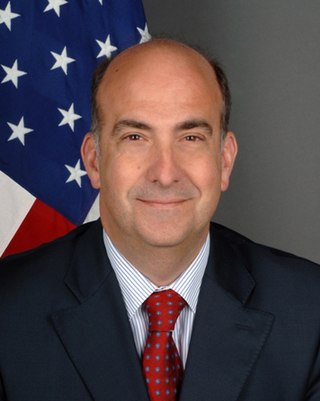
Kenneth H. Merten is an American diplomat who is the United States ambassador to Bulgaria since April 2023. Merten has served in various positions in the Department of State beginning in 1987, most notably as ambassador to Haiti from 2009 to 2012, ambassador to Croatia from 2012 to 2015, and special coordinator for Haiti from 2015 to 2017.
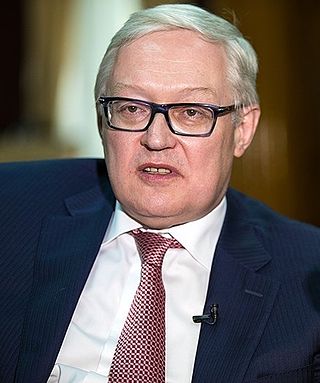
Sergei Alexeyevich Ryabkov is a Russian diplomat, currently serving as the Deputy Foreign Minister of the Russian Federation since 2008.
Melih Rauf Esenbel was a Turkish diplomat and former Minister of Foreign Affairs.

Richard Merrill Mills Jr. is an American diplomat serving as the United States ambassador to Nigeria since July 2024. He served as the United States deputy ambassador to the United Nations from 2020 to 2024 and, in that capacity, served as the U.S. Chargé d'Affaires and Acting Permanent Representative to the United Nations between January 20, 2021, and February 24, 2021, when Linda Thomas-Greenfield became ambassador.

Robert T. Yamate is an American diplomat of Japanese descent and a career member of the Senior Foreign Service. He previously served as the United States Ambassador to Madagascar and Comoros.
Philippe Hannibal Price was a Haitian diplomat and author.

Robin Diallo is an American diplomat who was the Deputy Chief of Mission at the U.S. Embassy in Haiti, serving under President Donald Trump.

Amos Eiran is a former president of the University of Haifa in Israel.

Brian Wesley Shukan is a career member of the Senior Foreign Service who is serving as the United States ambassador to Benin. He previously served as the U.S. chief of mission in Khartoum from October 2019 to January 2022.
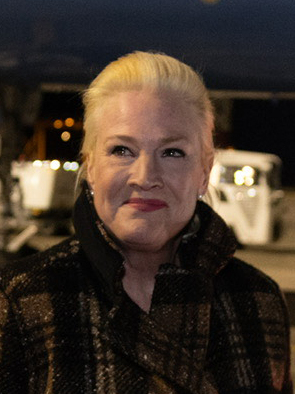
Angela Price Aggeler is an American diplomat who is the United States ambassador to North Macedonia.
The socioeconomic and political crisis in Haiti has been marked by rising energy prices due to the 2022 global energy crisis, as well as protests, and civil unrest against the government of Haiti, armed gang violence, an outbreak of cholera, shortages of fuel and clean drinking water, as well as widespread acute hunger. It is a continuation of instability and protests that began in 2018.
















